Harriet
 for thematic content throughout, violent material and language including racial epithets.
for thematic content throughout, violent material and language including racial epithets.
Reviewed by: Samiatu Dosunmu
CONTRIBUTOR
| Moral Rating: | Average (somewhat offensive) |
| Moviemaking Quality: |
|
| Primary Audience: | Adults Young-Adults Teens |
| Genre: | Biography History Drama |
| Length: | 2 hr. 5 min. |
| Year of Release: | 2019 |
| USA Release: |
September 10, 2019 (festival) November 1, 2019 (wide—2,059 theaters) DVD: January 28, 2020 |
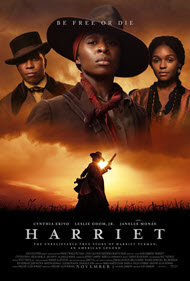

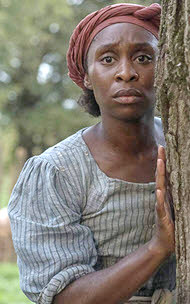
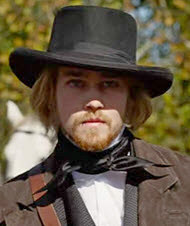
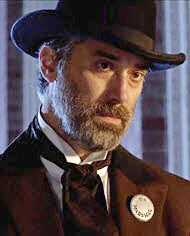
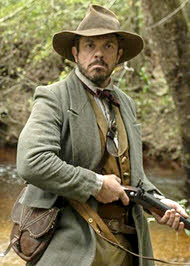
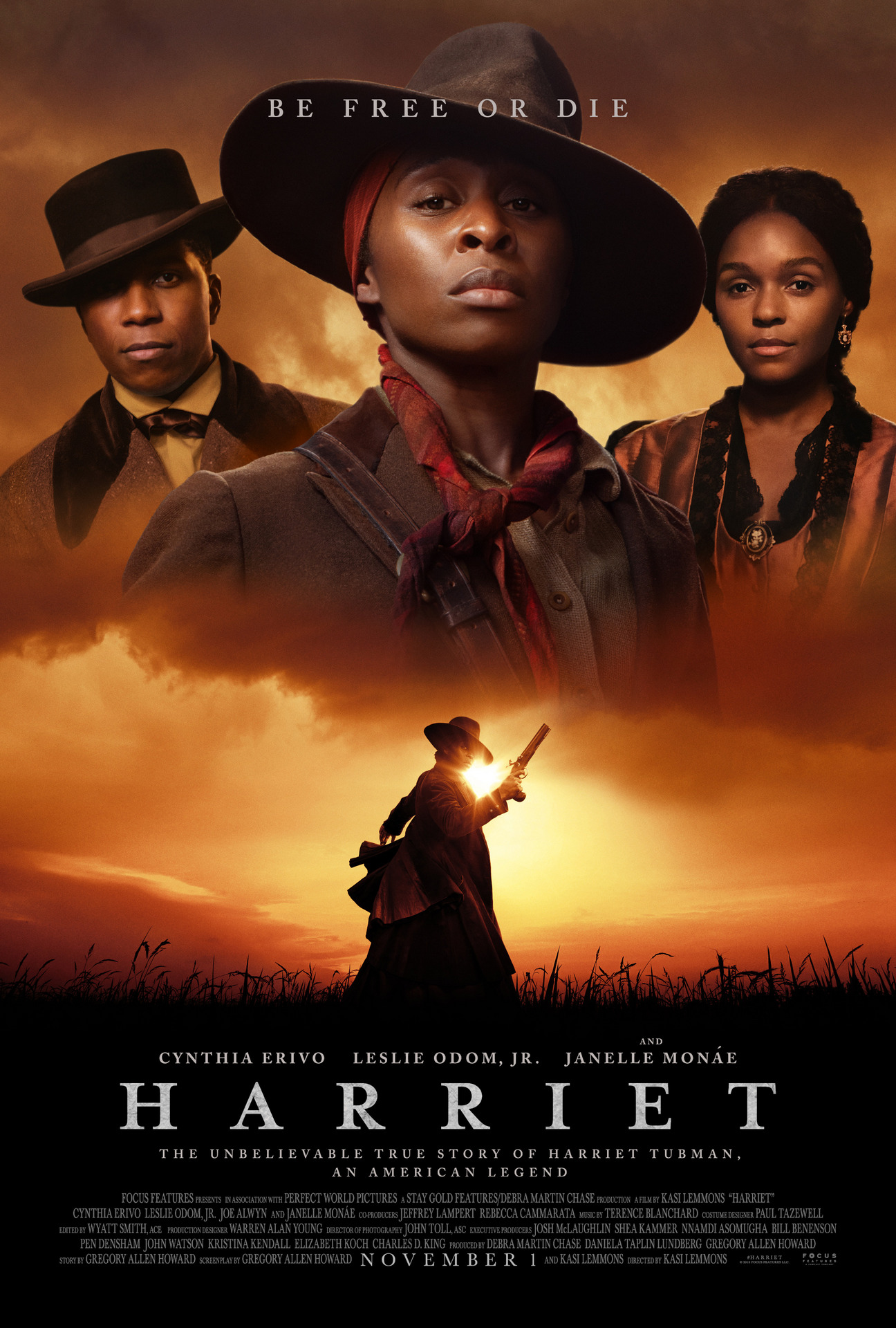
How does the true history of Harriet Tubman compare to the depiction in this movie?
Belief in God
The abolishment of slavery in America—largely led by Christians, their churches, and Republicans
RACISM—What are the consequences of racial prejudice and false beliefs about the origin of races? Answer
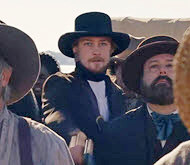
About murder
About the fall of mankind to worldwide depravity
What is SIN AND WICKEDNESS? Answer
American Civil War
Underground railroad
African Americans
Does the Bible condone slavery? Answer
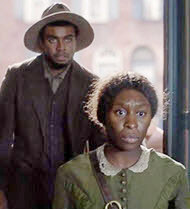
Death of a husband
About the fall of mankind to worldwide depravity
What is SIN AND WICKEDNESS? Answer
Why does God allow innocent people to suffer? Answer
What about the issue of suffering? Doesn’t this prove that there is no God and that we are on our own? Answer
Does God feel our pain? Answer
ORIGIN OF BAD THINGS—Why are they in our world if a good God created us? Answer
Did God make the world the way it is now? What kind of world would you create? Answer
Slaves and slavery as mentioned in the Bible
FOUNDING FATHERS AND SLAVERY—Were all of America’s Founding Fathers racists, pro-slavery, and hypocrites? Answer
For a follower of Christ, what is LOVE—a feeling, an emotion, or an action? Answer
What does the Bible say about WIDOWS?
| Featuring |
|---|
|
Cynthia Erivo … Harriet Tubman—John’s wife and Ben and Rit’s daughter Zackary Momoh … John Tubman—Harriet’s husband Vanessa Bell Calloway … Rit Ross—Harriet’s mother and Ben’s wife Clarke Peters … Ben Ross—Harriet’s father and Rit’s husband Leslie Odom Jr. … William Still, a writer and abolitionist who connects Tubman with the Underground Railroad Vondie Curtis-Hall … Reverend Samuel Green Janelle Monáe … Marie Buchanon—a proprietor and friend of Tubman Joe Alwyn … Gideon Brodess—Harriet’s slave owner Jennifer Nettles … Eliza Tim Guinee … Thomas Garrett See all » |
| Director |
|
Kasi Lemmons |
| Producer |
|
Martin Chase Productions New Balloon Perfect World Pictures [China] See all » |
| Distributor |
Harriet Tubman (Cynthia Erivo) was born “Arminta” Ross, in Maryland. She was known to everyone as “Minty.” Viewers are first introduced to a daydreaming Minty lying in the grass near a riverbank. She is roused out of her daydream by her husband John Tubman (Zackary Momoh).
It is Sunday, and they quickly rush to Master Brodess (Mike Marunde) and his family’s home for a sermon held by Samuel Green (Vondie Curtis-Hall), an African American Reverend. As the slaves gather and engage in praise and worship, Reverend Green reminds them that they are to obey their Master as the Lord commands it.
After service, a nervous Minty and her husband John approach Mr. Brodess to discuss the matter of her freedom. Minty is still a slave, while her husband John is free. The matter troubles Minty because she desires to have children; her children would be born as slaves, therefore making them the property of Mr. Brodess. Their request quickly infuriates Mr. Brodess, and he dismisses them quickly. He also forbids John from visiting Minty. Later, Minty is chastised by Gideon (Joe Alwyn), Mr. Brodess’s son for her insolence. He reminds her that she is his property, which explains the reason she has not been sold.
Awhile later, Mr. Brodess dies. His much younger wife Eliza (Jennifer Nettles) takes over managing the farm. She is quickly overwhelmed by her husband’s debts; she orders that Harriet be sold. Word quickly reaches Harriet who decides to escape and fight for her freedom.
On her own, she is advised by her father, Ben Ross (Clarke Peters), a free slave, to seek guidance from Reverend Green. Reverend Green instructs Minty how to get to Pennsylvania, a Northern and free state. Through a series of trials and help from various safe houses that are part of the Underground Railroad, Harriet makes it to Pennsylvania.
She is quickly greeted by William Still (Leslie Odom Jr.) a writer, abolitionist and member of the Underground Railroad. In Mr. Still’s office, she decides to take the name of Harriet (her mother’s real name) and the surname Tubman, her husband’s last name. Mr. Still asks Harriet how she made it from Maryland to Pennsylvania, she simply responds that it was her faith in God. Harriet is then acquainted with Marie Buchanon (Janelle Monáe), an inn proprietor and freed-slave.
A year passes, Harriet, now a free slave, feels concerned about her family. She decides to return to Maryland despite the objection of Mr. Still. Harriet is illiterate. She approaches Ms. Buchanon who agrees to help her. She teaches her how to be a “lady” and act literate.
With Ms. Buchanon’s teaching, she returns to Maryland. She immediately locates her husband only to discover that he is now re-married to a freed slave and is about to become a father. Despite her hurt, she locates her family, and decides to bring a group of slaves including her brothers on the journey to Pennsylvania.
Harriet would eventually go on to making several trips back and forth from Maryland to Pennsylvania. Impressed by her resilience and lack of casualties, Mr. Still invites her as an official member of the Underground Railroad society, a committee comprised of fellow abolitionist who believed slavery should be outlawed.
As a member of the society, she is given the role of conductor. Through her role, she manages to bring hundreds of slaves to freedom. Harriet would go on to become a Commander of Operations of Intelligence Operations of the Union Army during the Civil war beginning in 1861. She is respected as one of the few females to have led an army of over 150 men. In her lifetime, Harriet freed over 300 slaves.
Spiritual exploration
Spiritual abuse was exacted by many Southern religious authorities of that era; one may be quick to question their spiritual walk. Is it possible that these spiritual leaders later received a conviction to not only speak the truth but repent? There is evidence. However, one should not be quick to judge, as there was not only a misunderstanding of the gospel, but portions were withheld. It was a strategy to keep slaves in line, given that many were illiterate. Spiritual leaders would often remind slaves of Colossians 3:22 NIV—“Slaves [or Bondservants], obey your earthly masters in everything; and do it, not only when their eye is on you and to curry their favor, but with sincerity of heart and reverence for the Lord.”
However, they often omitted Colossians 4:1 ESV—“Masters, treat your slaves [or bondservants] justly and fairly, knowing that you also have a Master in heaven.” Paul’s definition of slaves and bondservants is different than the North American interpretation; some bondservants and slaves of the time were actually paid workers. Paul’s instruction is a guide to how we should behave towards our employer and in turn how an employer should treat their workers. Together, God has ordered family relationships from Creation.
In terms of conviction, there is evidence of repentance from spiritual leaders. In Harriet’s case, Reverend Green continued to guide slaves to freedom in her absence and eventually became part of the Underground Railroad network, thereby, risking his stature among slave owners. This was his way of showing repentance in the eyes of God.
Harriet Tubman’s identity
Historically, Harriet Tubman is seen as a “Christ-like figure” by some, because of her incredible courage. She is dubbed “Black Moses” because of her commitment to not only freeing slaves herself but promoting the abolition of slavery. Her ordeal mirrors that of the biblical version of Moses. However, did she see herself as a “Christ-like figure”? No, she did not.
To understand Harriet Tubman, one must understand the evolution of her identity in Christ. Jon Foreman lead singer, guitarist, main songwriter and co-founder of the alternative rock band Switchfoot, said in an interview, “It is easier to believe in God than God loves me.” Harriet was born a slave and identified as such until she realized that God is freedom.
“Rescue me from my enemies, O God. Protect me from those who have come to destroy me.” —Psalms 59:1
Harriet begins to see that God loves her because he brought her to freedom. Harriet commented on her first few years as a free woman, “I was free, but there was no one to welcome me to the land of freedom. I was a stranger in a strange land.” She feels a sense of duty to return to Maryland to check on her family, her determination was a demonstration of her commitment of her faith in God.
“But if anyone suffers as a Christian, let him not be ashamed but let him glorify God in having that name.” —1 Peter 4:16
Each trip she made, she felt it was worth the risk because the cause was greater than her personal safety. However, the film omitted a crucial piece: Harriet often had to work several jobs to save up for her trips back and forth from Maryland to Pennsylvania and eventually Canada. Once she understood her identity that she is a child of God and ultimate freedom is with him, she was able to discern and understand her purpose; her work was to serve others, which is a way to honor God. Albeit, she was illiterate, she understood the significance of Colossians 3:22.
Moviemaking quality and historical inaccuracy
Christians need to be mindful that this a secular film; there will be a misunderstanding of the Trinity. The understanding of Harriet Tubman’s faith is a subject for debate. The film portrays Harriet as a woman of courage and faith in God, who uses her connection to Christ to guide herself and others to freedom. At times, her faith is the subject of mockery. When Harriet returns to check on her family, a year into freedom, and decides to bring a group of slaves with her, her constant pause is interpreted as “Wait… she is listening for God again.” In reality, Harriet Tubman often suffered from dizzy spells due to a head injury she sustained as a teenager. The film interprets her condition as premonitions and insinuates that she was a prophet without understanding the significance of this spiritual gift. Furthermore, there is no historical evidence to support that claim.
She was a teacher; she used her experience to educate others, and it served her well as a spy during the Civil War. However, again the film omits that she was working to care for the sick and displaced slaves who were wounded and had nowhere to go.
There are also Feminist undertones, choosing to focus on her gender to underline her accomplishments during the Civil War.
Warning: There is an offensive scene where Harriet confronts her former slave master Gideon. As she is confronting him on the ethical reality that “God did not make people to own people,” the film insinuates that she can hear and see men fighting for freedom. This is meant to be a foreshadowing of the Civil War. However, in my opinion, the way this scene is portrayed is occult-like. I felt this disrespected Harriet Tubman’s memory.
- Violence: Heavy— includes… • man grabs woman by her throat and threatens to break her neck • man repeatedly punches woman in face and then fatally stomps on her face • dialog about past physical abuse by white men (torture, rape, etc.) • man shot in head (bloody) • etc.
- Profane language: Moderate— Harriet Tubman only uses God’s name reverently in prayer. Other characters use the following words in irreverent ways: • “G*d d*mn” (1) • “Oh my g*d” • “Great god” • “Gideon-d*mn” (3) • “h*ll” (5) • “d*mn” (2) • “She’s speaking to God” (meant mockingly)
- Vulgar/Crude language: Moderately Heavy— • possible “f**ked up” (1) • “You black b*tch” and “You’re gonna die bitch” • “Dangerous wench” (referring to Harriet) • “White wh*res” • “Ugly b*stard” • s-word (1) • There is derogatory use of the words N*gger and cracker.
- Sex: • Kiss with woman wrapping her legs around man’s waist • Reference to a man sleeping in brothels • Man offered opportunity to sexually abuse Harriet
- Nudity: Minor— • When Harriet takes a bath, her bare back is revealed, and her scars are visible. • She is bare shouldered after jumping into a lake when she is forced to chose between freedom or returning to Gideon (her owner).
- Occult: Minor
- Other: a characer urinates
See list of Relevant Issues—questions-and-answers.


Moral rating: Better than Average / Moviemaking quality: 5
Moral rating: Average / Moviemaking quality: 5
Moral rating: Good / Moviemaking quality: 4½
My family and I approach certain movies that are based on history with a view as that it is to be educational in understanding some part of history. “Black Hawk Down” and “We Were Soldiers” are examples of this, and I would include “Harriet” in this listing. Watching these movies was for a purpose, and not for entertainment.
Slavery in the Americas was a terrible tragedy and cannot be understated in the horror inflicted on countless human beings. As depicted in the movie, physical, mental, and sexual cruelty was common. Images and dialogue which depict this cruelty is necessarily blunt and bring to our eyes only a glimpse of the tragedy that was slavery.
As I tell others about the movie, I caution them about watching this movie with a purpose vs. watching to be entertained. The images/language/blasphemy are in line with historical records, but should never be considered as part of entertainment. Viewing with a purpose—education, ministry—would be an acceptable cause to attend the movie. However, attending for “fun” would be something I would strongly recommend against.
The discussion to have as one discerns whether they should attend would have to revolve around the entertainment value. Is any representation where images/language that are so apparently vulgar and/or blasphemous a cause to pass on attending? That is for the discerning believer to prayerfully seek.
The movie does depict communication from God to Harriet during the times of a loss of consciousness (from the head injury sustained previously—explained in the movie).
Certainly for mature audiences—I would not recommend taking young children for any reasons.
Moral rating: Offensive / Moviemaking quality: 4½
PLEASE share your observations and insights to be posted here.
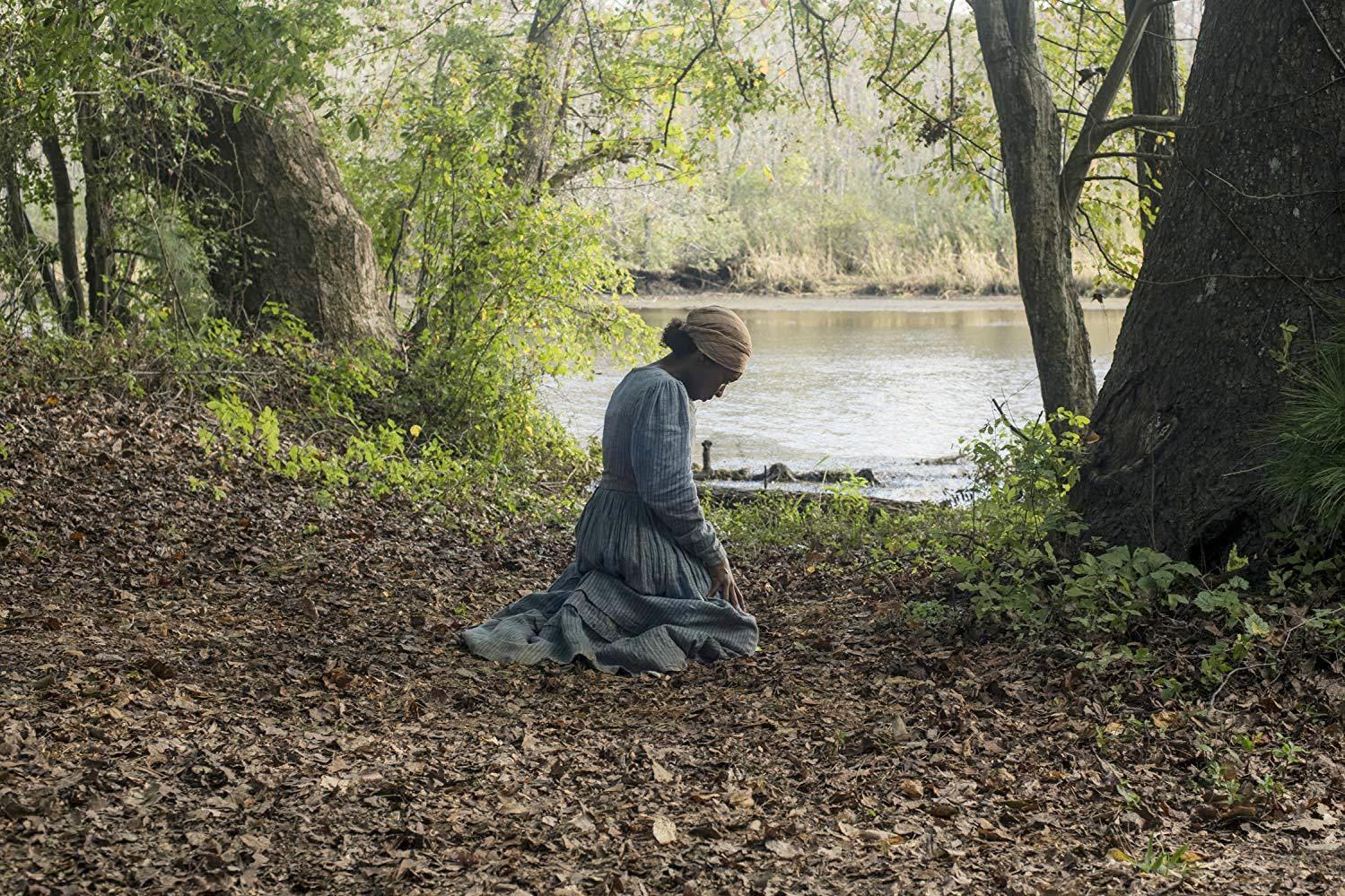


My Ratings: Moral rating: Better than Average / Moviemaking quality: 4